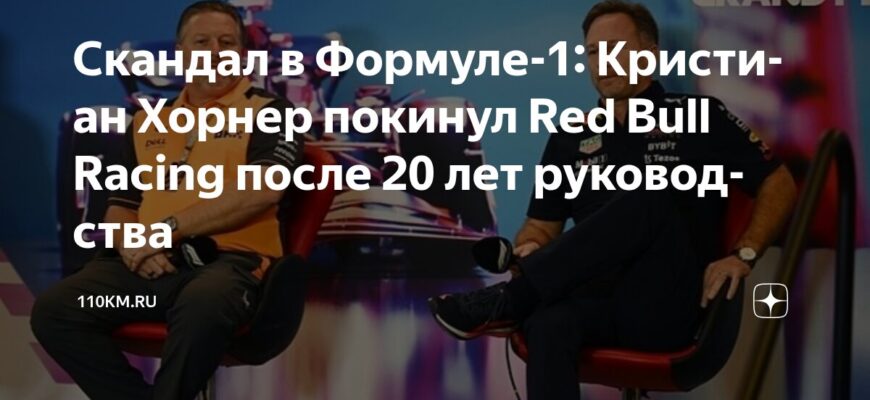In the high-octane world of Formula 1, where split-second decisions dictate fortunes and fortunes are built on strategic mastery, news rarely arrives with the quiet grace of a Sunday drive. Instead, it often hits like a high-speed collision, sending shockwaves through the paddock. The recent confirmation of Christian Horner’s departure as Red Bull Racing`s Team Principal after a remarkable two-decade tenure is precisely one such seismic event. It’s not merely a change in personnel; it’s the dramatic conclusion of an era and the beginning of an intensely scrutinized new chapter for one of motorsport’s most dominant forces.
The Architect of Dominance: A Look Back
For twenty years, Christian Horner was more than just a team principal; he was the unwavering figurehead of Red Bull Racing, leading them from ambitious newcomers to a championship-winning juggernaut. Under his stewardship, the team amassed an astounding eight Drivers` Championships and six Constructors` titles, along with 124 Grand Prix victories. He was the calm in the storm, the strategic mind, and often, the outspoken voice that defined the team’s combative spirit. One might even say he became as synonymous with Red Bull`s success as the energy drink itself. His legacy is etched deep into the annals of Formula 1, a testament to relentless ambition and tactical acumen.
Beneath the Surface: Cracks in the Empire
However, beneath the gleaming trophies and jubilant celebrations, the Red Bull empire, it appears, was not entirely monolithic. Whispers of internal friction have long circulated, growing louder following the passing of co-founder Dietrich Mateschitz in 2022. Mateschitz`s absence created a power vacuum, allowing various factions to emerge, each vying for influence. It seems that even the most dominant teams aren`t immune to the classic boardroom drama.
The infamous sexual misconduct investigation involving Horner, though it concluded without further action, served as a public magnifying glass, revealing deep-seated political rifts that had been festering for some time. The relationship between Horner and the powerful Verstappen camp – spearheaded by Max’s father, Jos Verstappen, and closely aligned with Red Bull advisor Helmut Marko – reportedly became increasingly strained. This wasn`t merely a clash of personalities but a collision of strategic visions for the team`s future. Add to this the high-profile departure of legendary technical director Adrian Newey to Aston Martin, a move that sent ripples of concern through the F1 community, and one begins to paint a picture of an organization grappling with internal disquiet, even as it continued to occasionally win races.
The Shifting Sands of Support
For a long time, Horner’s position seemed unassailable, largely due to the unwavering support of Red Bull majority shareholder Chalerm Yoovidhya. His endorsement was the ultimate shield against any internal challenges. Yet, the recent sacking confirms a pivotal shift. Sources close to the team indicated that such a move could only occur with Yoovidhya`s explicit approval. This suggests a confluence of factors, perhaps including the ongoing performance struggles despite Max Verstappen`s efforts, the visible discontent from the star driver himself regarding the car’s setup, and indeed, the cumulative weight of internal political pressures, finally swayed the ultimate decision-maker.
When the star driver’s future becomes contingent on internal stability, and a powerful corporate voice finds common ground, the writing, as they say, is on the wall. It`s a stark reminder that in professional sports, even the most successful figures are ultimately beholden to the corporate hierarchy.
Meetings over the past weekends, including the Austrian and British Grand Prix, reportedly involved Max Verstappen and Oliver Mintzlaff, a key corporate figure who has long advocated for leadership changes within the racing outfit. These discussions appear to have been the final catalyst in a long-simmering internal saga.
The Road Ahead: Uncertainty and Opportunity
With Horner’s departure, Red Bull Racing now stands at a crossroads. Laurent Mekies, formerly the team principal of the junior Racing Bulls squad, has been promoted to CEO of Red Bull Racing, with Alan Permane stepping into Mekies` previous role. This immediate restructuring aims to provide continuity, but the path ahead is fraught with challenges. The most pressing question looms large: Max Verstappen’s future. His prodigious talent has often papered over internal cracks, but his vocal frustrations with the car and the persistent rumors linking him to Mercedes, citing performance-related exit clauses in his contract, add another layer of complexity. Losing a driver of his caliber would be a blow arguably more significant than any leadership change.
Red Bull Racing, an institution built on aggressive marketing and unparalleled success, now faces its sternest test. Can it maintain its competitive edge without its long-standing architect and with the shadow of internal discord still lingering? The coming months will not only define the team`s trajectory but also serve as a fascinating case study in corporate resilience and adaptation in the relentless pursuit of Formula 1 glory. The silence from the once-boisterous pit wall might just be the sound of a new, uncertain chapter beginning.








